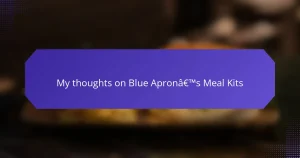Key takeaways
- Culinary challenges boost creativity and teamwork, transforming pressure into valuable learning experiences.
- Mastering essential cooking techniques, such as knife skills and flavor balancing, enhances both competition performance and everyday cooking.
- Embracing experimentation and maintaining organization in the kitchen can lead to delightful surprises and reduced stress.
- Viewing setbacks as learning opportunities fosters personal growth and builds confidence as a chef.
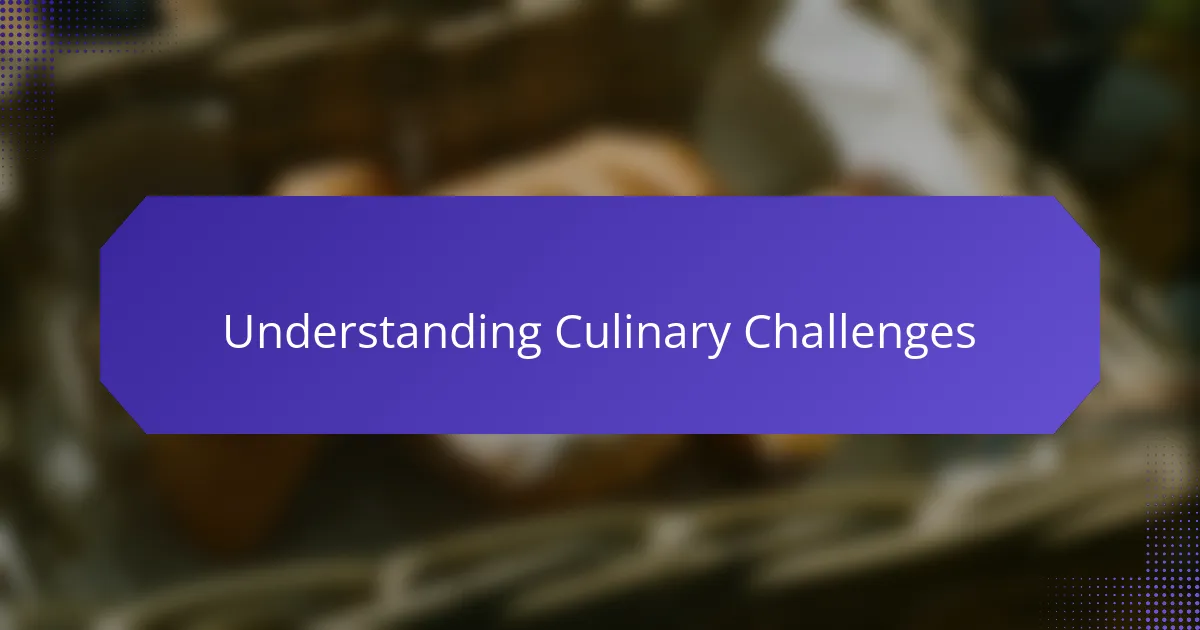
Understanding Culinary Challenges
Culinary challenges are not just tests of skill; they’re experiences that push you out of your comfort zone. I remember when I first faced a challenge that required a dish to be prepared in under an hour. That ticking clock had my heart racing, but it also ignited a fire within me to think creatively and work efficiently. Have you ever found yourself in a kitchen crunch, racing against time to create something amazing?
Facing culinary challenges can be intimidating, but they also offer valuable lessons in perseverance and adaptation. When I encountered a surprise ingredient in a competition, I felt panic wash over me. Yet, it forced me to trust my instincts and experiment, leading to a dish that was unexpectedly delightful. Isn’t it fascinating how a moment of uncertainty can lead to breakthroughs in creativity?
These challenges also foster a sense of community among culinary enthusiasts. I cherish the moments spent alongside fellow competitors—sharing tips, laughs, and even some mistakes. There’s something about competing together that bonds you, reminding you that every chef’s journey is filled with ups and downs. Have you ever found camaraderie in a pressure-filled situation? It’s those shared experiences that can turn competition into a celebration of culinary passion.
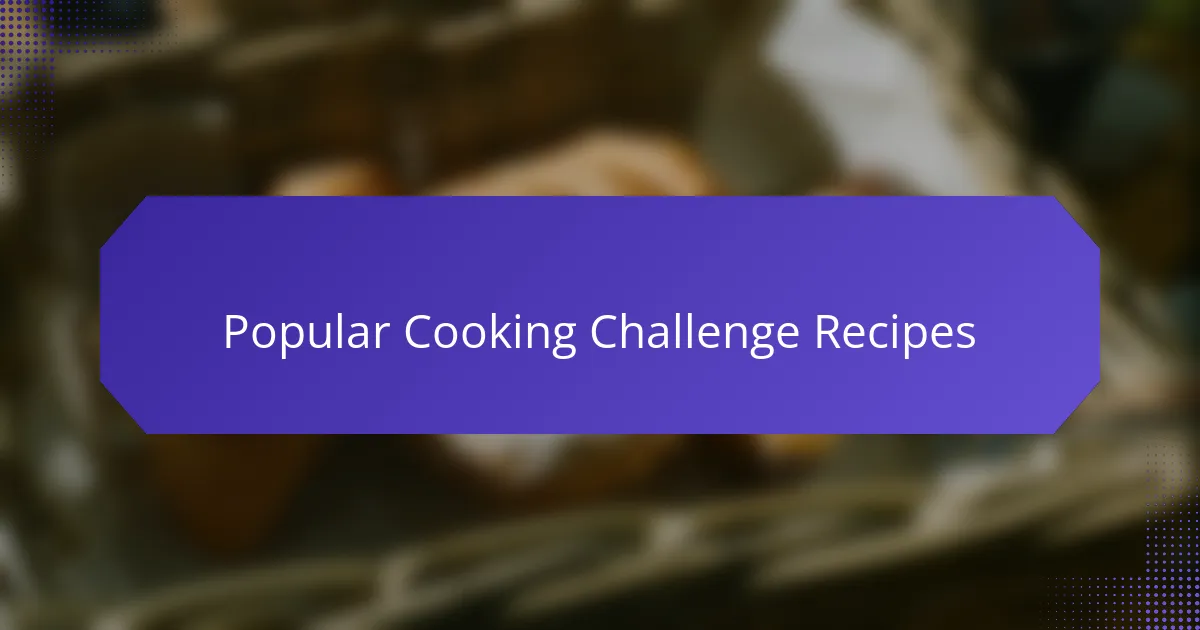
Popular Cooking Challenge Recipes
When it comes to popular cooking challenge recipes, one that stands out in my memory is the classic risotto. I vividly recall a challenge where each chef was required to create a unique version, pushing our creativity to the limit. The creamy texture and choice of flavors left us all experimenting, and I learned how a dish can evolve with just a simple twist—like adding saffron or wild mushrooms. Have you ever played with a classic recipe and discovered something entirely new?
Another memorable challenge featured the humble potato. We were tasked with transforming this versatile ingredient into gourmet creations. I remember whipping up a lavender-infused potato soup that amazed everyone, reminding me how even the simplest ingredients can shine with the right technique and imagination. Isn’t it incredible how one ingredient can inspire an entire meal?
Desserts also hold a special place in cooking challenges. I once tackled a timed dessert challenge centered on chocolate, which instantly struck a chord with my passion for sweets. The rush of melting, folding, and assembling under pressure led to a decadently rich fondant cake that quickly became a crowd favorite. Have you ever felt the joy of creating a dessert that satisfied not just your palate but also your creative spirit?
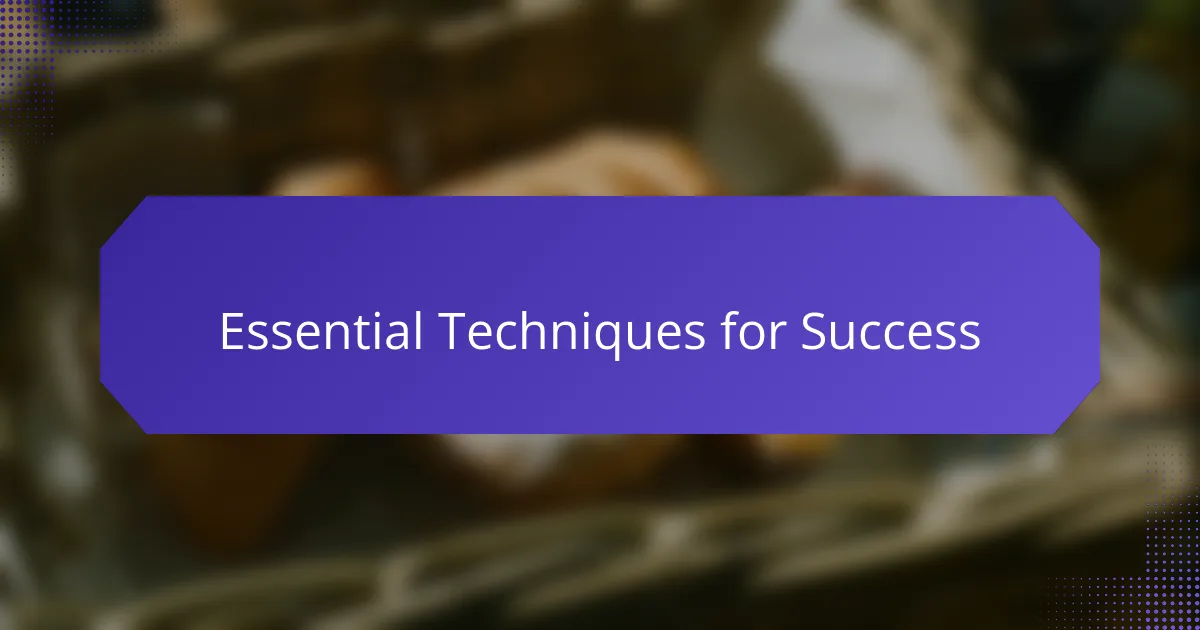
Essential Techniques for Success
When I participated in the America’s Culinary Federation challenges, mastering essential techniques was key to my success. I quickly learned that precision and consistency can make or break a dish. For instance, when I had to plate a complex entrée under pressure, my knife skills and understanding of flavor profiles allowed me to create a dish that both looked stunning and tasted exceptional.
Incorporating these core techniques helped not only in competition but also in my everyday cooking. When I was a novice, I often struggled with timing and execution. But through practice and focusing on these fundamentals, I developed the confidence to experiment and refine my culinary approach. Here are some crucial techniques that I found invaluable:
- Knife Skills: Mastering different cuts can elevate your presentation and cooking efficiency.
- Flavor Balancing: Understanding how to balance sweet, salty, sour, and bitter is essential for any dish.
- Plating Skills: Practice artful plating to enhance aesthetic appeal and impress judges or guests.
- Temperature Control: Learning to control cooking temperatures is vital for achieving perfect results.
- Time Management: Develop a solid game plan to execute steps efficiently, especially when under time constraints.
These techniques not only contributed to my competition performance but also transformed my everyday cooking experience.

Strategies for Cooking Under Pressure
When it comes to cooking under pressure, I’ve learned to embrace the chaos rather than fear it. One strategy that works for me is planning ahead; knowing my recipes inside and out helps me navigate the tight timelines. There was a moment during a competition where I misread the clock and realized I had only ten minutes left. Instead of panicking, I quickly prioritized my tasks and managed to plate an impressive dish just in time.
Another key tactic is maintaining a calm mindset. I remember taking a deep breath, focusing on each ingredient as I worked, which kept my hands steady and my mind clear. It’s amazing how a few moments of mindfulness can transform your cooking experience under stress.
Lastly, using simple yet effective techniques can save time and energy. During one challenge, I relied on one-pot cooking to minimize cleanup and maximize flavor, and it was a game-changer. This approach not only simplified the process but also allowed the flavors to meld beautifully.
| Strategy | Description |
|---|---|
| Planning Ahead | Know your recipes well to navigate tight timelines effectively. |
| Mindfulness | Stay calm and focused; use deep breathing to enhance clarity. |
| Simple Techniques | Employ one-pot cooking for efficiency and ease. |
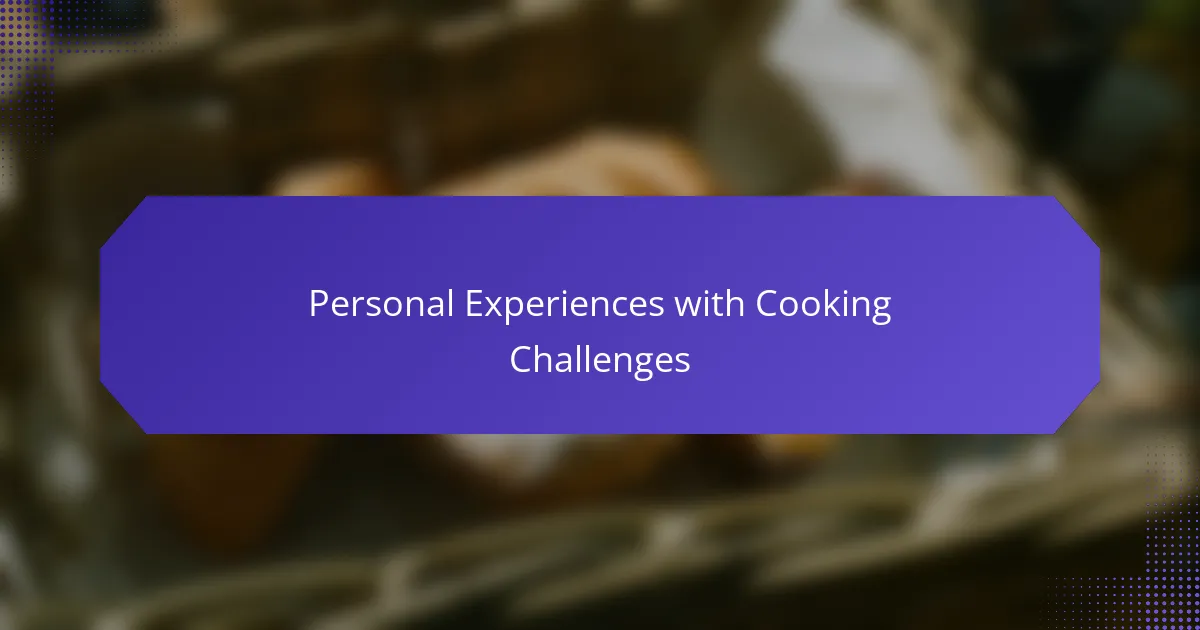
Personal Experiences with Cooking Challenges
Cooking challenges can be both exhilarating and daunting. I remember my first encounter with a culinary competition; the rush of adrenaline mixed with a sprinkle of self-doubt was overwhelming. But in the midst of the chaos, I discovered a deeper passion for cooking and an unexpected camaraderie with my fellow chefs.
One standout challenge was crafting a dish that paid homage to my heritage. As I sifted through my family recipes, I felt a connection to my past, infusing each ingredient with stories and memories that shaped my culinary journey. It reminded me that cooking is not just about technique; it’s about emotion and connection.
Through these experiences, I learned how to embrace imperfections and grow from them. Each challenge pushed my boundaries and became a stepping stone in my culinary adventure.
| Cooking Challenge | Personal Reflection |
|---|---|
| First Culinary Competition | Adrenaline and self-doubt fueled my passion. |
| Heritage Dish Challenge | Connecting with my roots brought new depth to my cooking. |
| Learning from Mistakes | Embracing imperfections led to personal growth and resilience. |
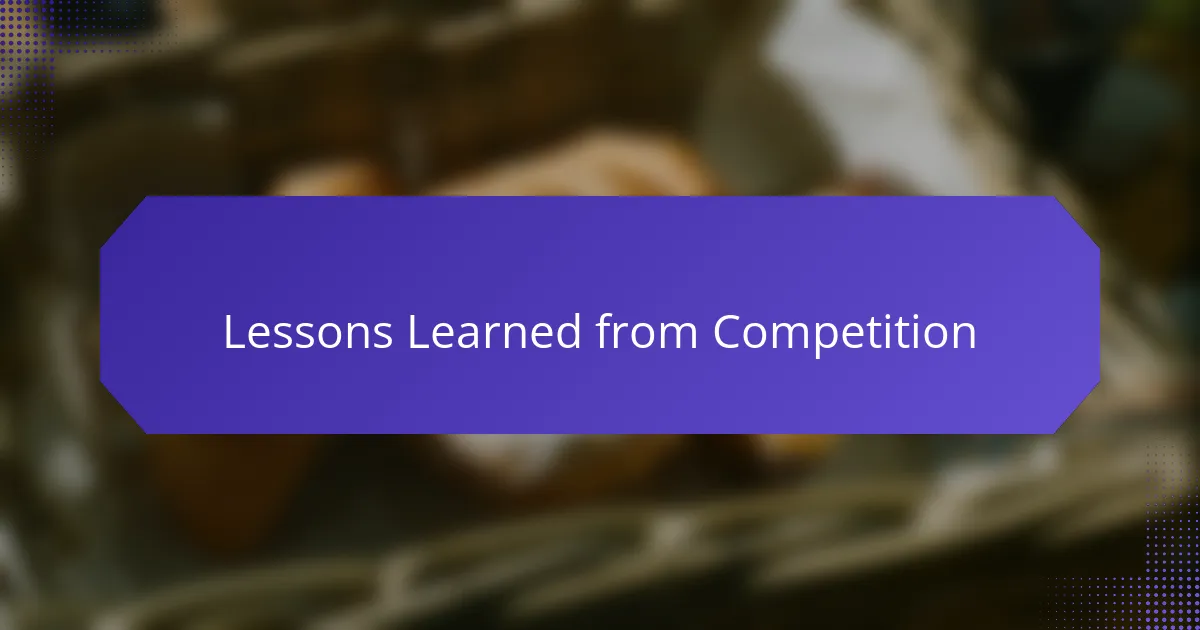
Lessons Learned from Competition
When I participated in the Americas Culinary Federation challenges, I discovered that preparation is everything. I learned that having a clear plan not only eases anxiety but also allows for creativity to flourish. One particular moment that stands out was when I had to adapt my dish on the spot due to an ingredient shortage. It taught me the importance of flexibility and thinking on my feet, turning a potential setback into an opportunity for innovation.
Another lesson I gleaned was the value of teamwork. I remember collaborating with fellow competitors who shared their unique insights and techniques. That camaraderie made the experience richer and reminded me that learning from others can elevate my own skills.
Lastly, the competition underscored the need for resilience. There were times when my dish didn’t come out as planned, but it was essential to approach setbacks with a positive attitude and view them as learning experiences. This resilience not only strengthened my culinary abilities but also built my confidence as a chef.
| Lesson | Personal Insight |
|---|---|
| Preparation is Key | Having a solid plan helped ease my anxiety and unleash my creativity. |
| Collaboration Enhances Learning | Working with others opened my eyes to new techniques and enriched my culinary perspective. |
| Resilience in the Face of Setbacks | Viewing challenges as learning experiences built my confidence and improved my skills. |

Tips for Future Culinary Challenges
For anyone diving into future culinary challenges, one key tip is to embrace experimentation. I can recall a moment when I took a bold step and swapped a traditional ingredient for something unconventional in a dish. The result was a flavor combination I had never imagined! Isn’t it exciting how taking risks in cooking can lead to delightful surprises?
Another essential strategy is to stay organized. I always found that having a clean, well-arranged workstation significantly improved my focus. During one hectic competition, I noticed that when my ingredients were prepped and easy to reach, I felt calmer and more efficient. Have you ever noticed how a little organization can cut down your stress while cooking?
Finally, I urge you to keep a growth mindset. A challenge might not always go as planned, and that’s perfectly okay! I remember plating a dish that looked perfect but lacked flavor. Instead of wallowing in disappointment, I viewed it as a stepping stone for improvement. Each setback is a learning opportunity, right? By reflecting on these moments, you’ll continually evolve as a chef and gain confidence in your abilities.

